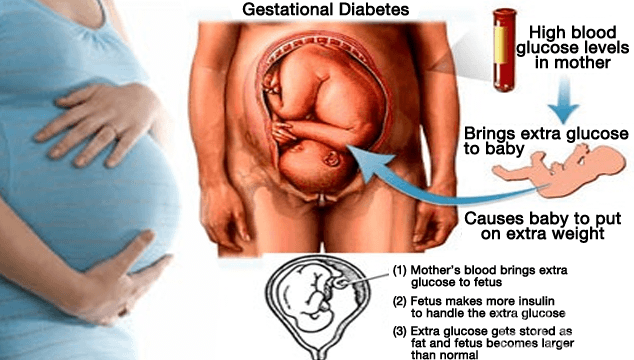
Gestational Diabetes is a form of diabetes that develops during pregnancy. Gestational diabetes, like regular diabetes, can cause serious health problems if left untreated. However, with gestational diabetes, there is also a risk of serious problems for the baby as well as the mother. Claim Your 20 Free Pregnancy Tests – Click Here
Some of the problems associated with Gestational Diabetes include Pre-Eclampsia, Preterm Labor, extremely high birth weight, and increased risk for both mother and baby to develop type 2 Diabetes later in life.

It is possible for any woman to develop Gestational Diabetes during pregnancy, but some women have more risk factors than others. For example, some ethnic groups, such as Hispanics, African Americans, Pacific Islanders, Native Americans, or Asians, are at a higher risk of developing Gestational Diabetes.
Also, if you have a family history of diabetes, you are more likely to develop Diabetes during pregnancy. Some of the other risk factors include being overweight, being over 30, having a previous problem with Gestational Diabetes, having a baby weighing over nine pounds in the past, or having a history of PCOS.
If you have any of these risk factors, your doctor might choose to test you for Gestational Diabetes as soon as you get pregnant. If your test is negative, or you do not have any of the above mentioned risk factors, you will be tested for Gestational Diabetes somewhere around your 24th to 28th week of pregnancy.

If you are at high risk for Gestational Diabetes, or you just want to make sure that you do not develop it while pregnant, there are a few things that you can do to help your chances. Read on for some tips.

One of the best things that you can do to decrease your risk of Gestational Diabetes is to make sure that you are making healthy food choices throughout your pregnancy. This includes decreasing your intake of white flours, white sugars, and tortillas and cereals made with white flour.
Try to choose whole wheat versions instead. Also, try to lower your overall sugar intake, and eat more high fiber foods to help stablize your blood sugar. You should also try to avoid deep fried or breaded foods as much as possible, and eat as many grilled or baked foods as you can.

Staying active is another important part of reducing your risk for gestational diabetes. Even just walking for 15 or 20 minutes following each meal will help to lower your blood sugar. You should also make sure to drink plenty of water when you exercise to avoid becoming dehydrated.
Your doctor should be able to tell you which exercise plan (if any) will be right for you during your pregnancy. You also need to keep an eye on your pregnancy weight gain and make sure that you are not gaining too much or too little weight.

Most women find that eating small meals or snacks several times throughout the day works best for them. This keeps blood sugar under control and helps to avoid that “crash” that we have all experienced. These few tips will help you get started to reducing your risk of Gestational Diabetes. If you are still looking for even more tips, ask your doctor or health care professional for specialized and personalized advice.










Comments